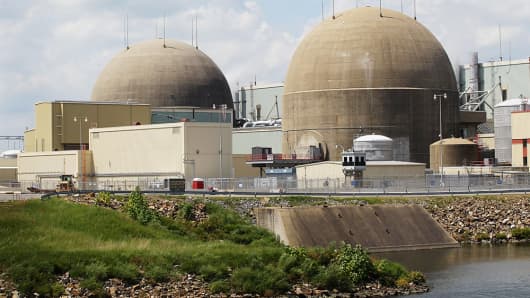The change in nuclear's fortunes is staggering, given that the U.S. is the world's largest producer of nuclear power, according to the World Nuclear Association. The country's 104 reactors account for more than 30 percent of nuclear electricity generation worldwide.
"Starting about four years ago, the industry felt it was in the middle of a renaissance" with applications for many new plants pending with the NRC, said Peter Bradford, a law professor and a former member of the commission. "They've gone from that high-water mark to a point at which … we're actually seeing the closing of a few operating plants,which was unthinkable even a few years ago."
With shale and natural gas gaining currency and the cost of building plants soaring, nuclear energy's stock is steadily being devalued. All this is playing out against the backdrop of Japan's nuclear disaster two years ago at Fukushima, which made policymakers think twice about extolling the virtues of nuclear power.
Bradford, who also served as a utility commissioner in New York and Maine, cited a "cauldron of events" for bringing the nuclear push to a standstill, including the use of cheaper and plentiful natural gas to generate electricity, as well as soaring investment costs.
"Nuclear is kind of the ocean liner of energy: Once it heads in a particular direction it's hard to turn it," Bradford said. Some observers had predicted that "many things could go wrong," he said, "but I don't think there were many of us that forecast they would all go wrong at once."
Just like its counterparts in the solar industry, nuclear power is in the throes of declining public policy support. Tax incentives and other forms of public subsidy are being withdrawn as the risks and costs associated with power plants rise.
(Read More: Once 'Overhyped and Sexy,' Solar Tumbles Back to Earth)
The shift dovetails with the lowered profile of climate change legislation in Washington, according to some.
Sherry Quirk, an attorney that leads Schiff Hardin's energy practice, noted local and federal officials' shift and the lack of climate change initiatives.
"Given concerns about climate change and the thought there might be ... new laws that would effectively make coal fire a thing of the past, they launched a number of plans," Quirk said. Now, "on the basis of price and risk analysis, the constructions of a number of nuclear facilities have been called into question."
Although nuclear power is touted as one of the cleanest forms of energy, only three units are under construction, and only four to six may come online in the next decade, according to data from the WNA.
That appears to reflect an energy policy that increasingly de-emphasizes alternative energy while placing a premium on fossil fuels.
"The so-called all-of-the-above energy strategy was always nonsensical," said Bradford, even more so given that nuclear power has become too pricey. "We don't fight world hunger with caviar, and we're not going to fight climate change with outlandishly expensive energy sources."
—By CNBC's Javier E. David





